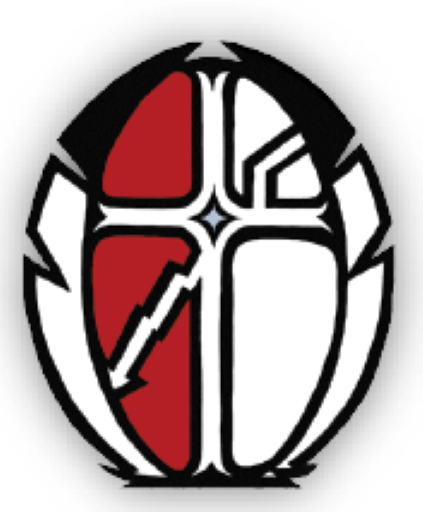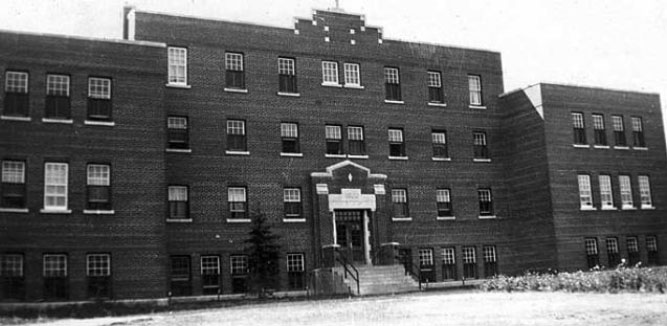By OMFRC Member D’Arcy Rheault – Originally Published as a Special Edition of Feathers In the Wind, 2012
The 1910 “History of Canada” text book for Ontario Public Schools taught young Canadians that:
“All Indians were superstitious, having strange ideas about nature. They thought that birds, beasts…were like men. Thus an Indian has been known to make a long speech of apology to a wounded bear. Such were the people whom the pioneers of our own race found lording it over the North American continent – this untamed savage of the forest who could not bring himself to submit to the restraints of European life.”
First missionary operated schools established near Quebec City, 1620-1629
In 1830 jurisdiction over “Indian” matters was transferred from the military authorities to the civilian governors of both Lower and Upper Canada.
1831, Mohawk Indian Residential School opens in Brantford, Ontario. It will become the longest operated residential school closing in 1969
1840‟s, Among Imperial figures, perhaps the most influential commentator on the “Native Question” during the early 1800‟s was Herman Merivale, a Professor of Political Economy at Oxford, who became permanent Under-Secretary of State for the Canadian Colonies.
Merivale believed that control of Indian affairs in the colonies was essential in order to maintain law and order and “civilize” the Indian population.
By 1841, Merivale developed and implemented four policy alternatives to be used to solve the “Indian Question.” They were direct and purposeful to say the least.
1. Extermination (by death or enfranchisement),
2. Slavery,
3. Insulation (reserves) and/or
4. Assimilation
1842-1844 The Bagot Commission report (named for Sir Charles Bagot, Governor General of British North America) proposed federally run Indian residential schools as a good tool for separating children from their parents and forcing Aboriginal peoples away from their traditional life. It also mandated that individuals carry only one legal status (e.g., Indian or citizen) thus disenfranchising most Indian and Métis people in Canada by forcing British citizenship upon them and completely erasing tribal identity and nationality..
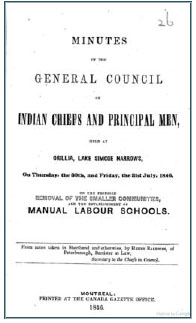 Indian Affairs Superintendent, P. G. Anderson, in 1846, at the General Council of Indian Chiefs and Principle Men in Orillia, Ontario stated “… it is because you do not feel, or know the value of education; you would not give up your idle roving habits, to enable your children to receive instruction. Therefore you remain poor, ignorant and miserable. It is found you cannot govern yourselves. And if left to be guided by your own judgement, you will never be better off that you are at the present; and your children will ever remain in ignorance. It has therefore been determined, that your children shall be sent to Schools, where they will forget their Indian habits and be instructed in all the necessary arts of civilized life, and become one with your white brethren
Indian Affairs Superintendent, P. G. Anderson, in 1846, at the General Council of Indian Chiefs and Principle Men in Orillia, Ontario stated “… it is because you do not feel, or know the value of education; you would not give up your idle roving habits, to enable your children to receive instruction. Therefore you remain poor, ignorant and miserable. It is found you cannot govern yourselves. And if left to be guided by your own judgement, you will never be better off that you are at the present; and your children will ever remain in ignorance. It has therefore been determined, that your children shall be sent to Schools, where they will forget their Indian habits and be instructed in all the necessary arts of civilized life, and become one with your white brethren
First federally run Residential School in Canada opens two years later, in 1848, in Alderville (Alnwick), Ontario.
1857, The Gradual Civilization Act is enacted.
Automatic enfranchisement (loss of status) of any Indian male over 21 who:
- can speak, read and write either English or French
- is of good moral character
- is free from debt
After the adoption of the 1867 Constitution Act, Canada formally instituted in law a policy of assimilation, designed to transform Native communities from “savage” to “civilized”.
In 1879, the Nicholas Flood Davin Report noted that “the (residential) school is the principal feature of the policy known as that of ‘aggressive civilization’….Indian culture is a contradiction in terms…they are uncivilized…the aim of education is to destroy the Indian.”
1885, traditional Indian ceremonies are declared illegal in Canada
1892, Canadian Government and Christian Churches enter into a formal agreement for religious institutions to run the schools:
- The Roman Catholic Church, the Church of England (Anglican), the Methodist (United) Church, and the Presbyterian Church
 It is for Status and non-Status Indians, Métis and Inuit children.
It is for Status and non-Status Indians, Métis and Inuit children.
- Children were referred to as “inmates”.
- Against the law for “Indians” to attend regular “public” schools until 1945.
- Canadian authorities “strongly encouraged” parents, under threat of possible prosecution and fines, to send their children to residential schools.
- Parents had to sign over custody of their children to the school superintendant or Principle, by law.
- Children were forcibly taken from their families by priests, Indian agents and police officers; often being kidnapped without the community’s knowledge.
- Children were taken long distances from their communities in order to discourage runaways.
- Children were taken from Walpole Island and sent to Shingwauk RS in Sault Ste. Marie (1200kms).
At school they were held captive, isolated from their families of origin and their siblings, and forcibly stripped of their language, religion, traditions and culture. Many Native parents travel sometimes hundreds of kilometers to camp next to a school hoping to see their children from a distance. Many Native children grow up with little or no knowledge of their original culture. In 1930, three-quarters of all Indian students are in grades 1 to 3 in Residential School and one-quarter in grade 4 to 6. Generally children as young as 3 and as old as 16 are attending residential schools.
Only 3% of all students progressed past grade 6. Students were discouraged by school officials to go on to higher grades and were often ordered out of the school by age sixteen.
Some of the schools did attempt to use positive reinforcement to encourage assimilation, but usually children who did not conform were punished, often by corporal punishment
1931, Peek of 82 active Residential Schools in Canada. In the 1940’s at a residential school in northwestern Ontario, near Kenora, a Federal Inspector, in a letter to the school’s administrator, admonished him for encouraging Native students to go to grade 9 and beyond. “If we let the Indian go to grade 9 then they’ll want to go to grade 10, and then they’ll want to go to university, and that’s what we don’t want!”. 1948, compulsory attendance ends but residential schools would continue to operate for almost another 50 years.
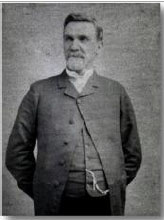 Dr. Peter Bryce
Dr. Peter Bryce
Medical Inspector for the Department for Indian Affairs (1904 -1920)
He visited 15 Western Canadian residential schools compiling mortality statistics from 1892 to 1907 finding that 30 to 60% of students had died from smallpox and tuberculosis over those 14-15-years and further that 25 to 50% had died in the very first year of school. He suggested the overall numbers could be even higher, noting that in one school alone, the death toll reached 69 per cent. (Globe and Mail, April 24, 2007) Submits full report to the Department of Indian Affairs in 1909. The government and Indian Affairs does nothing.
1922 – Out of frustration, he self -publishes “The Story of a National Crime” exposing the Churches and Canadian government‟s agenda of genocide. He wrote that Catholic and Protestant churches were deliberately exposing native children to smallpox and tuberculosis in residential schools across Canada, and letting them die untreated and that thousands of children had died as a result. (Globe and Mail, April 24, 2007) His book is largely ignored by the Federal Government and the public.
In 1910, Duncan Scott (a high level Indian Affairs Agent) in a letter to British Columbia Indian Agent General-Major D. MacKay, (in response to Peter Bryce‟s 1909 report) states:
“It is readily acknowledged that Indian children lose their natural resistance to illness by habituating so closely in the residential schools and that they die at a much higher rate than in their villages. But this does not justify a change in the policy of this Department which is geared towards a Final Solution of our Indian Problem.”
In 1914, Scott publically admits in his essay “History of Canadian Indians 1867-1912”, that “it is quite within the mark to say that fifty percent of the children who passed through these (IR) schools did not live to benefit from the education which they had received therein.”
In 1919 Scott abolishes the post of Medical Inspector for Indian Agencies effectively getting rid of Dr. Peter Bryce and ending reports about the death rates in Residential Schools.
In 1920, while tabling a new Government Bill for the Compulsory residential school attendance of all Indian, Métis and Inuit children, Scott stated:
“I want to get rid of the Indian problem. I do not think as a matter of fact, that this country ought to continually protect a class of people who are able to stand alone. That is my whole point. Our object is to continue until there is not a single Indian in Canada that has not been absorbed into the body politic, and there is no Indian question, and no Indian department, that is the whole object of this Bill” (D. C. Scott, 1920) The Bill is passed in 1920 and compulsory attendance for all Native children ages 7-15 years becomes law in Canada.
Adolph Hitler‟s Interest in the American “Wild West‟
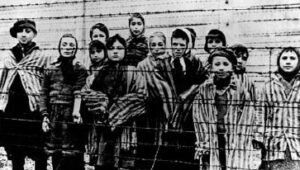 Hitler liked to draw an example of mass murder from American history. He viewed the fighting between cowboys and Indians in racial terms. In many of his speeches he referred with admiration to the victory of the white race in settling the American continent and driving out the inferior peoples, the Indians. (James Pool, “Hitler and His Secret Partners” 1998)
Hitler liked to draw an example of mass murder from American history. He viewed the fighting between cowboys and Indians in racial terms. In many of his speeches he referred with admiration to the victory of the white race in settling the American continent and driving out the inferior peoples, the Indians. (James Pool, “Hitler and His Secret Partners” 1998)
He was very interested in the way the Indian population had rapidly declined due to epidemics and starvation when the United States government forced them to live on reservations. He recognized the American government’s forced migrations of the Indians over great distances to barren reservation land as a deliberate policy of extermination. (Pool 1998)
“Hitler’s concept of concentration camps as well as the practicality of genocide owed much, as he himself claimed, to his studies of British and North American history. … and for the Indians in the Wild West. [He] often praised to his inner circle the efficiency of America’s extermination by starvation and uneven combat of the “Red Savages” who could not be tamed by captivity.” (John Toland, “Adolf Hitler” Vol II, 1976)
Truth Commission into Genocide in Canada
A 2001 report by the Truth Commission into Genocide in Canada documents the responsibility of the Roman Catholic Church, the United Church of Canada, the Anglican Church of Canada, and the federal government in the deaths of more than 50,000 Native children in the Canadian residential school system. The report stated that church officials killed children by beating, poisoning, electric shock, starvation, prolonged exposure to sub-zero cold while naked, and medical experimentation, including the removal of organs and radiation exposure. Canadian clergy, police, and business and government officials “rented out” children from residential schools to pedophile rings.
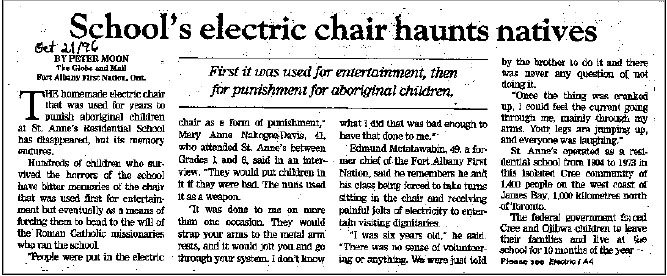
The Government of Canada built an educational system in which very young children were often forcibly removed from their homes, often taken far from their communities. Many were inadequately fed, clothed and housed. All were deprived of the care and nurturing of their parents, grandparents and communities. First Nations, Inuit and Métis languages and cultural practices were prohibited in these schools.
St. Anne’s Catholic Residential School, 1904 – 1973
Recounting his experience to reporters in 1996, Chief Ed Metawabin, Fort Albany First Nation (Northern Ontario) tells of being shocked in an electric chair at age six “to entertain visiting dignitaries” at the St. Anne’s Catholic Residential School. The electric chair remained in the school’s basement until the school was closed in 1973.
Residential School Mass Graves across Canada
(from International Tribunal into Crimes of Church and State – Squamish Nation, 10 April, 2008)
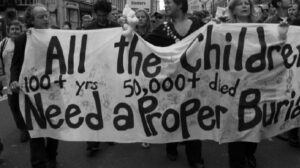 Some examples:
Some examples:
Alert Bay : St. Michael‟s Anglican school (1878-1975), Site is an overgrown field adjacent to the building, and also under the foundations of the present new building, constructed during the 1960‟s. Skeletons seen “between the walls”.
Saddle Lake : Bluequills Catholic school (1898-1970), building intact, skeletons and skulls observed in basement furnace. Mass grave reported adjacent to school.
Hobbema: Ermineskin Catholic school (1916-1973), five intact skeletons observed in school furnace. Graves under former building foundations.
Fort Albany : St. Anne’s Catholic school (1936-1964). Children killed in electric chair buried next to school.
Spanish: Catholic school (1883-1965). Numerous graves.
Brantford : Mohawk Institute, Anglican church (1850-1969), building intact. Series of graves in orchard behind school building, under rows of trees.
Forced Sterilization
Canadian legislation permitting the sterilization of any residential school “inmate” was passed in Alberta in 1928 and in BC in 1933 and both ran until 1972. The Sexual Sterilization Act allowed a Residential School Superintendant or Principal to order the sterilization of any Native person under his charge. As their legal guardian (due to parents having to sign over custody), the Superintendent or Principal had the legal right to have any Native child sterilized. Frequently, these sterilizations occurred to whole groups of Native children when they reached puberty at institutions like the Provincial Training School in Red Deer, Alberta, the Ponoka Mental Hospital, Alberta and the United Church Sterilization Centre in Bella Bella B.C. Hospital – site of native sterilizations and medical experiments between 1923 and 1969.
CBC Broadcast – Date: March 13, 1955
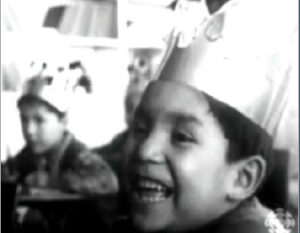 Because of the staggering death rates and the general public beginning to suspect a problem, the Federal Government produced a number of “positive” short films on Residential Schools.
Because of the staggering death rates and the general public beginning to suspect a problem, the Federal Government produced a number of “positive” short films on Residential Schools.
From “A New Future” (http://ms.radio-canada.ca/archives_new/2003/en/wmv/residential19550313et1.wmv) “Orphans, convalescents and those who live too deep in the bush for day school: these are the students of the residential school in remote Moose Factory, Ont. For 10 months a year, these native children — some taken from their homes — start each day with a religious service before heading to classes. A CBC Television crew visits the school to salute Education Week — and here, the education is all about how to integrate into mainstream Canadian society.”
The 60’s Scoop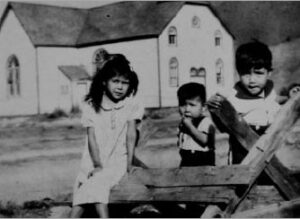
The 60’s Scoop in Canada refers to the removal of Aboriginal children from their homes from 1960 to the mid 1980’s. It is so named because the highest numbers of children removed took place in the 1960’s. In many instances, children were literally scooped from their homes without knowledge or consent of families and/or their communities. Government authorities and social workers acted under the colonial assumption that Native people were culturally inferior and unable to adequately provide for the needs of their children. Children’s Aid Society removed Aboriginal children from their families and communities and either placed them in foster care or adopted them out into non-Native homes. Children were always sent far away from their community; mainly out of the home province and many were sent outside of Canada to Europe.
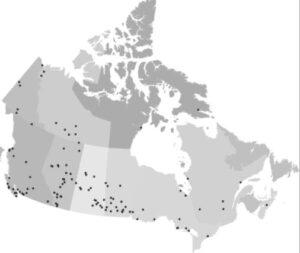 The Last Federal Residential School in Canada
The Last Federal Residential School in Canada
Grand total of 130 Schools across Canada.
1931, Peek of 82 active Residential Schools.
In 1948 there were 72 residential schools with 9,368 students attending.
In 1979 there were 12 residential schools left with 1,899 students attending.
From 1850‟s to 1948 approximately 120,000 Indian, Métis and Inuit children were forced by federal law through the Residential school system.
About 30,000 attended after 1948.
Less than 80,000 are still living in 2011.
Death rate as high as 69% in some schools (most children dying the first year).
90,000 claims since early 1990‟s of physically and/or sexually abuse.
Canadian Federal Indian Residential Schools were operated for 150 years, from 1848 to 1996.
The Gordon Reserve Indian Residential School, the last Residential School, closed in 1996 and was torn down shortly afterwards. The Gordon reserve lies 100 km north of Regina.
Residential School Syndrome
The trauma suffered in residential schools would lead to what has been described as Residential School Syndrome (RSS), a combination of historical trauma and a sub-type of posttraumatic stress disorder (PTSD) as defined in DSM-IV. Residential school syndrome continues to work its way through contemporary Aboriginal societies. All Aboriginal societies struggle with intergenerational RSS including the survivors as well as their spouses, parents, siblings, children, and friends.
Symptoms can include the following:
- Acute self-conflict
- Reduced self-esteem
- Emotional numbing (inability to trust or form lasting bonds)
- Somatic disorder
- Chronic depression and anxiety
- Insomnia and nightmares
- Disassociation
- Paranoia
- Sexual dysfunction
- Heightened irritability, tendency to fly into rages
- Strong tendencies toward alcoholism/drug addiction
- Suicidality

On June 11, 2008, the Prime Minister of Canada, Stephen Harper, made a Statement of Apology to former students of Indian Residential Schools, on behalf of the Government of Canada. Exerpts:
“For more than a century, Indian Residential Schools separated over 150,000 Aboriginal children from their families and communities. In the 1870’s, the federal government, partly in order to meet its obligation to educate Aboriginal children, began to play a role in the development and administration of these schools. Two primary objectives of the Residential Schools system were to remove and isolate children from the influence of their homes, families, traditions and cultures, and to assimilate them into the dominant culture. These objectives were based on the assumption Aboriginal cultures and spiritual beliefs were inferior and unequal. Indeed, some sought, as it was infamously said, “to kill the Indian in the child”. Today, we recognize that this policy of assimilation was wrong, has caused great harm, and has no place in our country.”
“The burden of this experience has been on your shoulders for far too long. The burden is properly ours as a Government, and as a country. There is no place in Canada for the attitudes that inspired the Indian Residential Schools system to ever prevail again. You have been working on recovering from this experience for a long time and in a very real sense, we are now joining you on this journey. The Government of Canada sincerely apologizes and asks the forgiveness of the Aboriginal peoples of this country for failing them so profoundly.”
Tell us what you really think Mr. Prime Minister…
 PM Harper made the following remark September 25, 2009 (15 months after the Statement of Apology) at a news conference with international media during the G20 Summit in Pittsburgh, US.
PM Harper made the following remark September 25, 2009 (15 months after the Statement of Apology) at a news conference with international media during the G20 Summit in Pittsburgh, US.
“We are one of the most stable regimes in history. We are unique in that regard,” (noting Canada had enjoyed more than 150 years of untroubled Parliamentary democracy)
“We also have no history of colonialism. So we have all of the things that many people admire about the great powers but none of the things that threaten or bother them.” For the forcibly colonized First Nation, Métis and Inuit peoples of this land and Residential School survivors, this statement came as quite a shock. Outraged Indigenous Peoples as well as many Canadians wondered aloud whether the veracity of the earlier Statement of Apology could be trusted. Many said no.

Commissioners from left to right: Chief Wilton Littlechild, Honourable Justice Murray Sinclair (Chair), Marie Wilson
The Future
Truth and Reconciliation Commission
With the support of the Assembly of First Nations and Inuit organizations, former residential school students took the federal government and the churches to court. Their cases led to the Indian Residential Schools Settlement Agreement, the largest class-action settlement in Canadian history. The agreement sought to begin repairing the harm caused by residential schools.
Aside from providing compensation to former students, the agreement called for the establishment of The Truth and Reconciliation Commission of Canada with a budget of $60-million over five years. Begun in 2009, the mandate of the Truth and Reconciliation Commission is to inform all Canadians about what happened in Indian Residential Schools (IRS). The Commission will document the truth of survivors, families, communities and anyone personally affected by the IRS experience. This includes First Nations, Inuit and Métis former Indian Residential School students, their families, communities, the Churches, former school employees, Government and Canadians citizens.
“And in the end we will ensure that the whole world hears their truths and the truth about residential schools, so that future generations of Aboriginal and non-Aboriginal Canadians will be able to hold to the statement that resonates with all of us: This must never happen again”
Justice Murray Sinclair, Chairperson, July 22, 2009
Final Thoughts
It is somewhat disconcerting for me to discover how many Canadians are completely ignorant of this part of Canadian history. I teach classes on Aboriginal history and culture and in each and every one of those classes there is always the same reaction from students as I take them through the history of Indian Residential Schools in Canada – an initial confusion due to a lack of awareness, usually some kind of denial, then shock and horror and finally anger and deep shame of being citizens of a society that created and carried-out its depraved agenda of mass murder and genocide.
It is worth pointing out that genocide is clearly defined in Article II of the Convention on the Prevention and Punishment of Genocide for over 60 years (U.N. General Assembly, 9 December 1948). Article II states in part:
“In the present Convention, genocide means any of the following acts committed with intent to destroy, in whole or in part, a national, ethnical, racial or religious group, as such:
a. Killing members of the group;
b. Causing serious bodily or mental harm to members of the group;
c. Deliberately inflicting on the group conditions of life calculated to bring about its physical destruction in whole or in part;
d. Imposing measures intended to prevent births within the group;
e. Forcibly transferring children of the group to another group”.
Canada Scores 5 for 5
Do I really need to say that this is an open and shut case of over 150 years of organized, calculated and legally enforced genocide of the Indigenous cultures and peoples of Canada? Well yes, unfortunately I do.
The bad news – Canada’s government and the Christian religious organizations involved will never be made to rightly suffer any punishment from the international community for their crimes against humanity.
The good news – Canada’s agenda of genocide failed miserably and absolutely. We are still here and thriving. (Over 50% of the Status/non-Status, Métis and Inuit population in Canada is under 25). Aboriginal cultures and traditions are for all intents and purposes intact. Our languages are returning. Our Elders, Traditional Teachers, ceremonies, political protocols and traditional philosophies are beginning to show themselves after more than a century and a half of being secretly passed down from one generation to the next – always hidden from a tireless evil that wanted to wipe Aboriginal peoples and cultures from the face of the earth.
So what are we to do now; oppressor and oppressed? Continue to hate one another? Mistrust one another? To follow a Prime Minister that believes that there is no history of colonialism in Canada? In essence, perpetuate the vicious evil that allows settlers to this land to think they have the right to exterminate tens of thousands of human beings? No. The time has come to live freely and honestly with one another.
Grandfather William Commanda (Algonquin, 1913, 2011) once stated:“We have been through the fires of oppression. We have felt the whip of hate. We have tasted our blood and tears as it ran into the bosom of our sacred Mother, Earth. The history of our two peoples, one Red, one White has been written in blood and suffering. The lands where the Anishinaabe lived from “time immemorial” were taken by armed force. Our people were killed. Genocide, incarceration, disease, was and, still is in many parts of this hemisphere, the price to pay for being Indigenous.
We must forgive. There is no option. By forgiving we liberate, not only ourselves, but also our oppressor. By forgiving we open the door to those who desire forgiveness. It is not that we believe we are superior to those people who, because of their fear, blindness and isolation did not see us as we are, their brother and sister, their father and mother, their lover, their friend. Through forgiveness we allow the spirits of our ancestors to accomplish their mission…”
The spirits of our ancestors have been waited for over 150 years, and it is time for them to come out of the shadows and help us heal our world.
References
“The Bagot Commission: Developing a Corporate Memory for the Indian Department” John Leslie Historical Papers / Communications historiques, vol. 17, n° 1, 1982, p. 31-52. (http://www.erudit.org/revue/hp/1982/v17/n1/030883ar.pdf)
http://bsnorrell.blogspot.com/2010/07/residential-school-survivor-queen-of.html
http://www.mediaindigena.com/roberta-stout/issues-and-politics/residential-school-money-has-it-helped-survivors-heal
http://citizenshift.org/node/28786&dossier_nid=28633
http://www.thecanadianencyclopedia.com/PrinterFriendly.cfm?Params=J1ARTJ0003980
www.aboriginalsocialwork.ca/scoop.html
http://faculty.marianopolis.edu/c.belanger/quebechistory/encyclopedia/HistoryofCanadianIndians-1867-1912.htm
http://www.libertadlatina.org/US_Canada_Rape_of_Indigenous_in_Boarding_Schools.htm
http://itccs.org/2011/02/02/mass-graves-at-former-indian-residential-schools-and-hospitals-across-canada/
http://www.trc.ca/websites/trcinstitution/index.php?p=4
http://www.collectionscanada.gc.ca/aboriginal-heritage/020016-2002-e.html
http://www.hiddenfromhistory.org/RecentUpdatesampArticles/Apr102008LocationofMassGravesRevealed/tabid/71/Default.aspx
http://www.michael-robinett.com/declass/c000.htm
